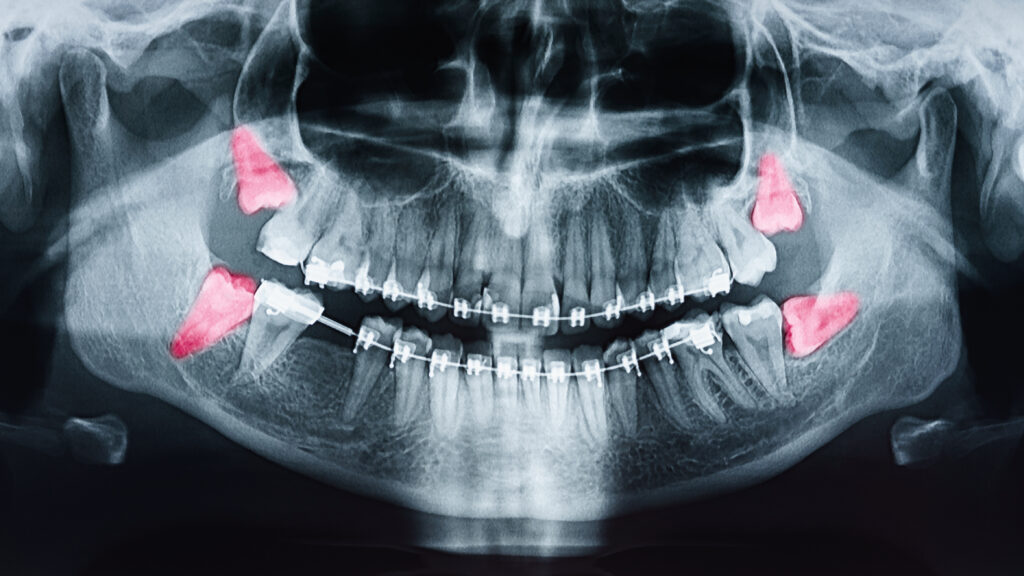(435) 649-9492
1729 Sidewinder Dr #102 Park City, UT 84060
Wisdom Teeth Removal in Park City

Wisdom Teeth Removal: Procedure and Considerations
Why is it Necessary to Remove the Wisdom Teeth?
- Wisdom teeth are often unable to fully come out due to the lack of space, known as being impacted, which can lead to pain, swelling, and infection.
- Impacted wisdom teeth often result in tooth decay and gum disease due to difficulty in cleaning around them.
- Wisdom teeth can affect the alignment of other teeth by pushing against them.
- Cysts or tumors can sometimes develop around impacted wisdom teeth, potentially damaging the jawbone and other teeth if not addressed.
The Removal Process
- Initial Examination: During the first consultation, the dentist will examine the status of the wisdom teeth using X-rays or CT scans. The alignment, position, and available space for the teeth to emerge will be assessed to determine if extraction is necessary.
- Sedation and Anesthesia: To ensure the best experience, depending on the position of the wisdom teeth, the surgeon may recommend performing the procedure under local anesthesia, sedation, or general anesthesia.
- Surgical Removal: To extract the tooth, the surgeon will make an incision to remove the wisdom tooth. If the tooth cannot come out in one piece, the surgeon will need to cut the tooth into pieces for successful extraction.
- Stitches and Recovery: To close the incision made during extraction, dissolvable stitches are placed to help in the healing process.
After Extraction and Recovery
- After the procedure, your dentist may prescribe antibiotics to help manage discomfort and pain.
- Resting after the extraction of the wisdom teeth will help the process to heal faster.
- Instructions will be provided on the diet you need to follow, recommending soft foods, and advice on oral hygiene to prevent infection.
- Attending the Follow-up appointments will be important to monitor the healing process and take care of any complications such as dry socket or infection.

Common Myths
Myth: Everyone needs to have their wisdom teeth extracted.
Fact: Not everyone needs to remove their wisdom teeth. This is only necessary when the teeth are causing problems or could lead to health issues due to not having space or complications in emerging properly.
Myth: The recovery from wisdom teeth extraction is always painful and long.
Fact: During the procedure, some type of anesthesia is applied to help manage the pain. After the extraction, medication is provided to manage discomfort and help with the recovery process. We strive to make this process as quick and painless as possible.
Myth: Removing wisdom teeth causes facial changes.
Fact: Removing wisdom teeth does not cause facial changes. This procedure is recommended only to avoid complications when there is not enough space for the third molars to emerge properly. If they are not removed, this can cause significant problems as the alignment of your other teeth will be affected, as well as your oral health.
Wisdom teeth removal is a common dental procedure that can prevent various oral health issues and alleviate discomfort. Understanding the process, post-care, and addressing common misconceptions can help patients approach this treatment with confidence and clarity.
Experiencing issues with your wisdom teeth? Don’t wait for complications to develop. Call to schedule a Free comprehensive evaluation at (435) 649-9492.
Frequently Asked Questions
The wisdom teeth are the last set of teeth to emerge, typically during our teens and early twenties. They are located at the very back of the jaw, these teeth can sometimes become trapped underneath the gum line due to a lack of space. When this happens, it can affect your oral health and misalign the other teeth. Because of that, it is important to take action and extract them to avoid pain, infection, and future complications.
The signs indicating that you may need to remove your wisdom teeth include pain, discomfort, infection, gum disease, and your teeth shifting to make space for the wisdom teeth to emerge. This is why it’s crucial to ensure that the wisdom teeth are emerging properly, so they do not cause any complications in the future.
For the best experience, it is recommended to remove wisdom teeth in the late teens and early twenties. During this period, the roots of the wisdom teeth have not fully developed, which can facilitate the extraction procedure and reduce the recovery time needed to heal.
The procedure to remove a wisdom tooth involves making an incision in the gum to access the tooth. In some complicated cases, the surgeon may need to cut the tooth into small pieces to facilitate removing it. Following the extraction, the surgeon will clean the area, use dissolvable stitches to seal the gums, and help the healing process.
Depending on the complexity of the procedure, physical health, and individual needs, the surgeon will recommend the most suitable type of anesthesia to ensure you have the best experience. The options the surgeon may use for the procedure include general anesthesia, sedation, and local anesthesia. After the procedure, medication will be prescribed to help manage discomfort and help in the healing process.
Depending on the complexity of the procedure, you may experience swelling, bruising, and mild pain. All of this should be temporary and go away within a few days. It is important to follow step by step the instructions provided to help with the recovery process. These can include taking the medication prescribed, putting ice packs on the swollen areas, eating soft foods, resting, and avoiding physical activities for a few days.
The recovery process can depend on how complex the procedure is and varies from person to person. Most people can return to their normal activities within a few days after the procedure. However, not feeling sore and swelling could take up to two weeks. Following the instructions provided to help with the healing process, such as eating soft foods, resting, taking the medication prescribed, and putting ice packs on the swollen areas, will determine how quickly you may heal.
There can be risks at any point during a surgical procedure. The risks during the removal of the wisdom teeth can include damage to the nerve, infection, dry socket, and impacting other teeth in your jaw. Although these risks are rare, it is crucial to seek a professional dentist with experience to minimize these risks.
This will depend on the type of anesthesia chosen. For those preferring not to be conscious or feel anything during the procedure, sedation anesthesia is the most suitable option. This method is often used in complex cases or for patients who are very anxious about the surgery. Another common option is local anesthesia, where only the area around the wisdom teeth is numbed. You will be fully awake and might feel some pressure and discomfort but no pain. The surgeon will go over each method, and the decision will be based on your specific needs, health, and comfort.
To help the process of healing after the procedure, it is crucial to follow the instructions given to you. These instructions may include eating soft foods, putting ice packs on the swollen areas, avoiding sucking through a straw, and resting for a few days. Maintaining good oral hygiene is also important, be sure to rinse and wash your mouth carefully to prevent infection.
BOOKING HOURS
M 7-3 | Tu 7-3 | Wed 7-3 | Th 7-3 | Fr 7-3
We are OPEN for ALL dental care procedures and emergency needs. Protecting the health and safety of our patients, families, and team members remains our number one priority.
Free $50 Gift Card*
$50 Gift Card when you complete an appointment with us!
*Redeemable after completed paid treatment. Must be a new patient our organization (all locations). The patient will receive a gift card via email or SMS after completion of their appointment. Cannot be combined with other offers or dental discount plans.
Free Exam & X-rays^
For New Patients without insurance we offer Free Exam and X-rays!
^For New Patients that do not have dental insurance. New patients must be 18 or older to receive free exam and x-rays. Discounts cannot be combined with other offers or dental discount plans. Additional fees may be included in individual cases.
$99 Hygiene Visit^^
For New Patients without insurance we offer Free Exam and X-rays!
^^For new patients without dental insurance. Includes Exam, X-Ray and Routine Cleaning. A Periodontal Cleaning requires additional fees, and rescheduled for further treatment. Cannot be combined with other offers or dental discount plans.

